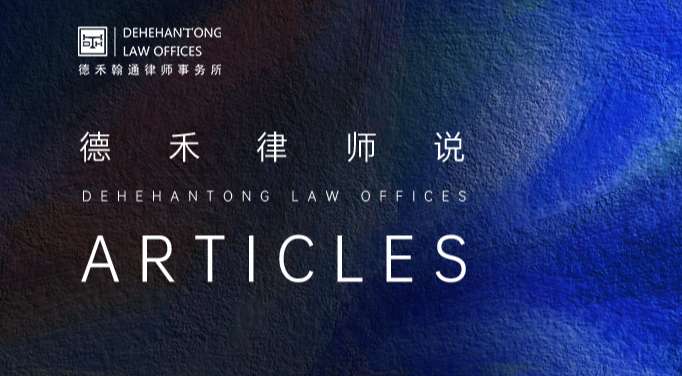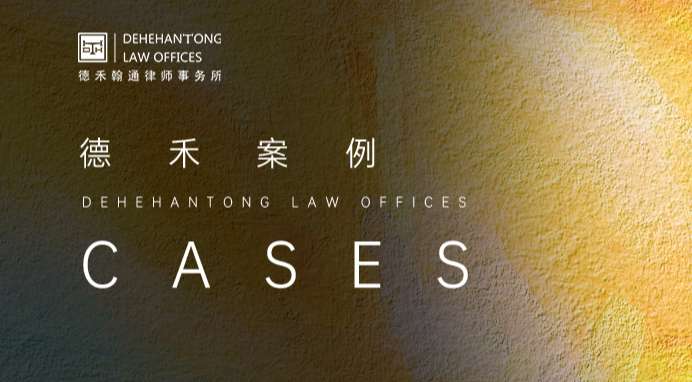Dehehantong successfully defended himself against a reduced sentence: He changed from issuing false special invoices to illegally purchasing special invoices and was granted probation
In the field of criminal defense, the accurate definition of the charges against criminal suspects directly affects the sentencing outcome and the application of law. This article takes a case of issuing false value-added tax special invoices, represented by Senior partners Chen Shilei and Zheng Chen of the Shanghai office of Dehe Hantong, as well as Ma Keting of the Shanghai office, as an example to deeply analyze how to successfully change the "crime of issuing false value-added tax special invoices" to the "crime of illegally purchasing value-added tax special invoices" from the perspective of infringing upon legal interests.
There are many overlapping areas in the behavioral patterns of the crime of issuing false value-added tax special invoices and the crime of illegally purchasing value-added tax special invoices. In judicial practice, there is a possibility of confusion in the application of the two crimes. The sentencing differences between these two crimes are extremely huge. Therefore, the characterization of the client's actions is of vital importance to defense lawyers and there is considerable room for defense. In this case, the defense team facilitated the procuratorate to change the nature of the charges, converting the crime of issuing false value-added tax special invoices, which could potentially be sentenced to nearly ten years in prison, to the crime of illegally purchasing value-added tax special invoices, which could be sentenced to less than three years in prison, and applying probation. This is a significant success for both the client and the defense team, and it also provides a brand-new approach for the defense of such cases. It can serve as a reference for other case-handling authorities and defense lawyers in similar cases.
01 Case Overview
This case involves Company X and its legal representative A and finance department B. From June 2015 to December 2017, Company X illegally purchased 670 value-added tax special invoices by transferring funds to 14 companies including Company Y and repatriating funds, paying for invoice collection fees. The total price and tax amounted to over 77.68 million yuan, with a tax amount of over 4.72 million yuan. Some of the invoices have been certified for deduction. At the beginning of the case, A and B were investigated for the crime of "issuing false value-added tax special invoices". Subsequently, the public security organ transferred the case to the procuratorate for the crime of issuing false value-added tax special invoices. If the charge is established, the defendant may be sentenced to nearly ten years in prison.
02 Distinguishing the Infringement of Legal Interests by Two Charges
Although the crime of issuing false value-added tax special invoices and the crime of illegally purchasing value-added tax special invoices both belong to crimes that endanger tax collection and administration, there are obvious differences in the infringement of legal interests:
The crime of issuing false value-added tax special invoices: It infringes upon the legal interests of the state's value-added tax collection and administration order as well as property ownership. This crime, through the act of false invoicing, leads to the illegal deduction of state tax revenue, causing direct losses to the state's tax revenue, undermining the value-added tax management system of "controlling taxes with invoices and refunding taxes based on invoices", and eroding the foundation of the state's finance.
2. The crime of illegally purchasing special VAT invoices: It mainly infringes upon the national invoice management system, that is, the order of invoice management. The perpetrator illegally obtains invoices, disrupting the normal invoice issuance and circulation procedures. However, it does not necessarily lead to the fraud of state tax revenue, and its harm to the state tax revenue itself is relatively small.
03 The sentencing differences of the two charges in this case
The "Judicial Appraisal Opinion" of this case shows that in terms of invoice receipt, Company X received 670 value-added tax special invoices issued by 14 companies including Company Z, with a total amount of 72,960,465.50 yuan and a tax amount of 4,728,494.50 yuan, and the total price and tax amount was 77,688,960 yuan. As of December 2017, among 670 invoices, 452 had been certified, with a value-added tax amount of over 3.4 million yuan. At the level of capital return: From July 2015 to January 2018, after X Company transferred 77.68 million yuan of funds to the above-mentioned 14 companies, there was capital return through personal accounts such as Finance B, with a recovery ratio ranging from 91.50% to 100%. Furthermore, from January 2016 to December 2017, Individual B in finance received over 570,000 yuan from Individual C and others.
A value-added tax special invoice with a tax amount of over 4 million yuan, if convicted of the crime of "issuing false value-added tax special invoices", will face about eight years in prison according to relevant laws and regulations, and the starting point of the sentence is relatively high and the punishment is severe. The maximum statutory penalty for the crime of "illegally purchasing special VAT invoices" is five years of fixed-term imprisonment, and probation is usually also applied. In this case, although Company X had no actual and genuine business transactions with the 14 companies, the amount of transactions it made with other companies was equivalent to the amount of invoices it purchased from the 14 companies. That is, the amount of invoices illegally purchased by the party was not significantly lower than the tax offset. Therefore, our team decided that the defendant's purpose was to falsely inflate performance and normal transaction flow, etc. Rather than starting from the two perspectives of issuing false invoices to offset taxes and defraud tax payments:
1. From the perspective of inflated performance
In some enterprises, the performance assessment of employees is linked to indicators such as sales volume. The party concerned issues false value-added tax special invoices to increase the sales volume or operating income and other performance indicators of the enterprise, thereby achieving the purpose of improving personal or team performance, obtaining higher bonuses, promotion opportunities, etc. For instance, if an enterprise stipulates that employees must complete a certain amount of sales tasks within a certain period to receive corresponding rewards, the party concerned may, in order to fulfill the tasks, purchase special VAT invoices to falsely increase sales without any real transactions.
For some enterprises, inflating performance might be an attempt to showcase their business scale and strength to the outside world, in order to attract investors, partners or customers. Inflated sales and performance can leave a good impression on the outside world, enhance the competitiveness and attractiveness of the enterprise in the market, and thereby bring more cooperation opportunities and resources to the enterprise.
2. Normal flow Angle of water
In some business activities, there may be a demand for capital flow among enterprises. For instance, in order to maintain normal capital turnover, cope with bank loan reviews or other capital supervision requirements, enterprises need to have a certain amount of capital flow. The party concerned purchases value-added tax special invoices and creates capital flow through false invoiced transactions to make the enterprise's financial statements appear more in line with the requirements, thereby smoothly obtaining bank loans or passing other fund supervision.
In some special circumstances, such as in inter-enterprise fund lending or related-party transactions, in order to conceal the true flow and nature of funds, it is possible to divert accounts by issuing false value-added tax special invoices. This can make the flow of funds more concealed and avoid arousing suspicion from regulatory authorities.
It should be noted that the above-mentioned purposes cannot cover up the illegality of the act of issuing false value-added tax special invoices. Regardless of the purpose, issuing false value-added tax special invoices is a violation of national tax laws and regulations, which will disrupt the order of tax collection and administration and cause tax losses to the state. The state will punish it according to law, but due to the difference in subjective purposes, there are significant differences in the determination of guilt and sentencing.
04 Defense Strategy and Legal Basis
(1) Comprehensively sort out the factual evidence
The defense carefully examined the bank transaction details, the electronic data of the tax authorities' verification of additional invoices, the audit report and other evidence. Although it was confirmed that Company X had illegally obtained invoices, no subjective intention or objective behavior of issuing false invoices was found.
(2) Accurately analyze the application of the law
A thorough comparison of the constituent elements of the two crimes reveals that the crime of issuing false value-added tax special invoices requires the act of false issuance and the result of tax fraud and deduction, while the crime of illegally purchasing value-added tax special invoices focuses on the illegal acquisition of the invoices themselves. In this case, Company X has no evidence to show that it has engaged in the act of issuing false invoices, so it is more in line with the crime of illegally purchasing special VAT invoices.
(3) Thoroughly consider the criminal purpose
According to the Supreme People's Court, the core of the crime of issuing false value-added tax special invoices lies in fraudulently offsetting taxes. In this case, Company X illegally purchased invoices, mainly for normal business deductions. Company X indeed did not have any actual business transactions with the 14 companies involved in the case. However, its transaction methods with other clients were flexible, including various forms such as mutual offset of payment for goods and goods. Therefore, it was unable to issue invoices for each one. Under the circumstances where the investigation authorities were unable to clarify the specific amounts involved, the defense believes that it cannot be determined that the defendant had the subjective intention to defraud tax offsets. Moreover, before the incident, the defendant voluntarily paid back the taxes, further confirming that he had no such intention. His actions had only limited disruption to the national tax collection and administration order, with a focus on infringing upon the invoice management order.
(4) Utilize the circumstances of self-surrender and confession and acceptance of punishment
After receiving A phone call from the police officer, A and B voluntarily surrendered and truthfully confessed, which constituted self-surrender. Moreover, both of them voluntarily plead guilty and accept punishment, demonstrating a repentant attitude. According to law, they can be dealt with leniently or lightly.
(V) Prepay the fine deposit before the trial
A prepaid a fine deposit of 80,000 yuan and B prepaid 50,000 yuan before the trial, highlighting the sincerity of guilty plea and repentance, and providing a basis for lenient sentencing.
(6) In-depth analysis of subjective intent
Subjectively speaking, the defendant accepted invoices mainly to solve the company's business problems such as capital turnover, rather than with the direct purpose of defrauding state taxes. In terms of capital reflux, after in-depth investigation and analysis of relevant bank statements, it was found that the amount, time and purpose of capital reflux can all be reasonably explained, which is different from the capital reflux model carried out to cover up the false issuance behavior in the crime of issuing false value-added tax special invoices. In addition, an in-depth investigation was conducted into the so-called "business transactions" with the 14 companies involved in the case, and a large amount of evidence was collected. The way the defendant obtained the invoices was more inclined towards purchasing behavior, which can prove that the defendant did not have the purpose of falsely issuing value-added tax special invoices to defraud the state of tax revenue. In criminal law, the subjective intent of the actor has a crucial influence on conviction and sentencing. In this case, the actions of Company X are more inclined to illegally purchase special VAT invoices to falsely inflate performance and normal transaction flow, rather than defrauding state taxes by issuing false deductions. This difference in subjective intent is precisely an important basis for distinguishing the two crimes, and it also makes the conviction of the parties involved in the crime of "illegally purchasing special VAT invoices" more reasonable and fair.
05 Referee Results and Analysis
The court adopted the defense opinion and changed the charge to the crime of illegally purchasing special VAT invoices. A was sentenced to two years and five months in prison, suspended for two years and five months, and fined 80,000 yuan. B was sentenced to two years and three months in prison, suspended for two years and three months, and fined 50,000 yuan. The court pointed out that the actions of Company X met the constituent elements of the crime of illegally purchasing value-added tax special invoices. Based on the circumstances of self-surrender and confession and acceptance of punishment, the punishment was mitigated and probation was applied.
06 Conclusion
There are many overlapping areas in the behavioral patterns of the crime of issuing false value-added tax special invoices and the crime of illegally purchasing value-added tax special invoices. In judicial practice, there is a possibility of confusion in the application of the two crimes. Through precise legal analysis and effective defense strategies, the defense team facilitated the procuratorate to change the nature of the charges, converting the crime of issuing false value-added tax special invoices, which could potentially be sentenced to nearly ten years in prison, to the crime of illegally purchasing value-added tax special invoices, which could be sentenced to less than three years in prison, and applying probation. This is a significant success for both the client and the defense team. This is also the duty and mission of criminal defense lawyers. The judgment result of this case is significantly lower than the sentence in the prosecution opinion, demonstrating the fairness and flexibility of the law and providing an important reference for the defense of similar cases.
Recommended Information
-
UpdatesDehehantong has successfully been included in the database of China Xiongan Group Co., LTD2025-06-13
-
UpdatesDehehantong and the School of International Education of Shanghai Business School held a dialogue and exchange activity on practical legal aid between China and foreign countries under the background of the "Belt and Road Initiative"2025-06-12
-
Case StudiesDehehantong successfully defended his case of assisting in information network criminal activities and was not prosecuted on suspicion2025-06-12
-
UpdatesDehehantong donated to establish a teaching award fund for Linshui Middle School in Sichuan Province2025-06-10
-
UpdatesLawyers from Dehehantong deeply participated in the "Anti-Monopoly Compliance in the Pharmaceutical Industry" seminar, jointly building a new ecosystem for the compliant development of the industry2025-06-06















